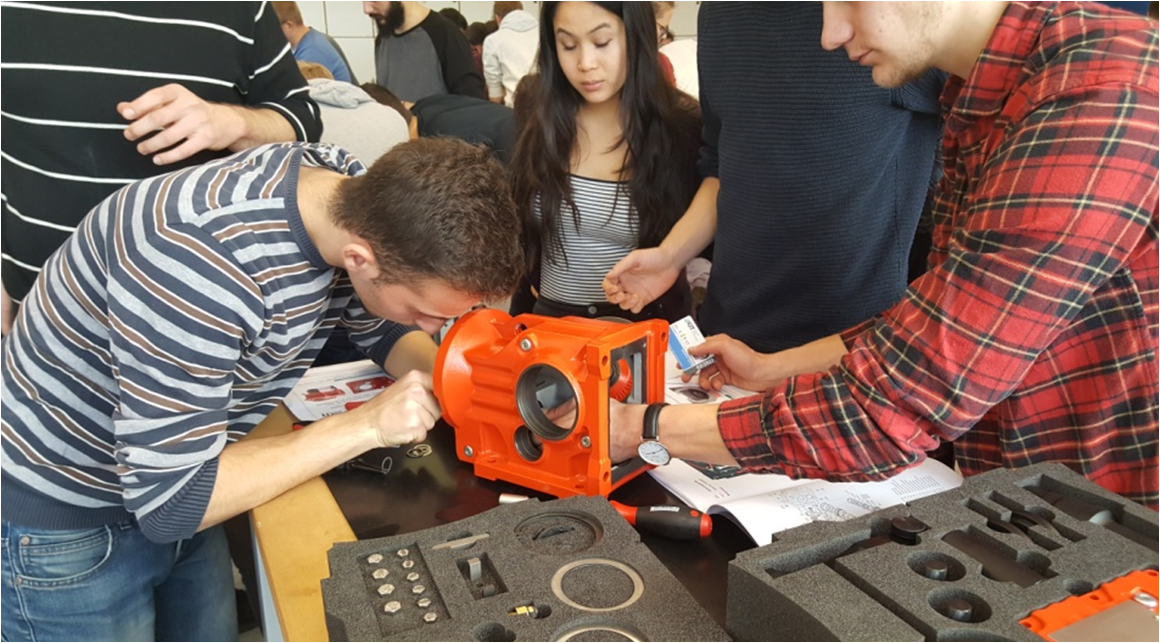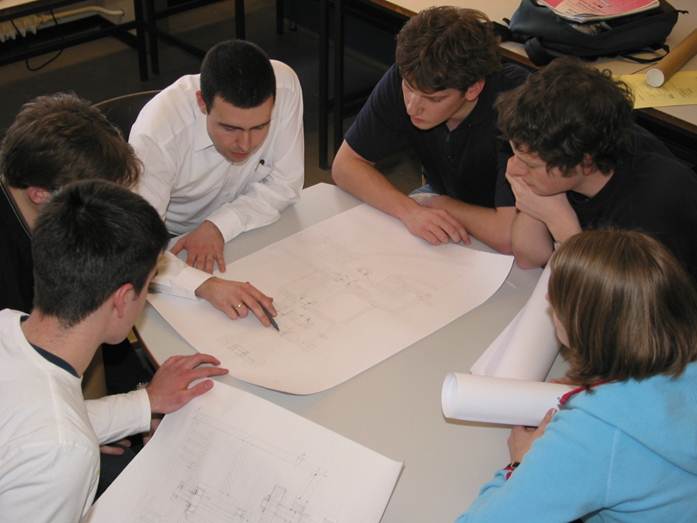Karlsruhe teaching model for product engineering - KaLeP
Mechanical engineering at the University Karlsruhe (TH) has a long and obligatory tradition. Outstanding personalities have fundamentally influenced the teaching and research in the field of mechanical engineering.
Following this Tradition , a didactic approach has been developed at the IPEK- Institute of Product Engineering, that enables an engineer to acquire the necessary knowledge under the conditions of advancing globalisation and the resulting changed requirements at a high level:
The "Karlsruhe Teaching Model for Product Development - KaLeP" is an integrated training system that is oriented towards the development process in practice. The concept was implemented in 1996 by Albers et al. at IPEK - Institute for Product Development. The aim of the teaching model is to impart the competence to solve new problems independently. This is done by independent, accompanied learning in a scientific working environment. It mainly includes the way of learning, the learning environment and the acquisition of key qualifications.
According to Albers and Spöttl (2013), the learning process should be accompanied in different ways:
- Lectures serve to target and promote the acquisition of knowledge.
- Exercises are intended to stimulate reflection on the learning process.
- Project work should enable the transfer and application of knowledge.
This triad of different modules has been supported by the Karlsruhe Teaching Model for Product Development - KaLeP since 1996.
Each of the three points covers different educational objectives. In the lectures, the theoretical basics are taught, which form the basis for the other two points. Semester-long exercises serve the practical application of the theoretical knowledge to various problems. In addition, the accompanying project-based workshops offer the opportunity to apply the acquired knowledge independently. The focus is on independent work in small project groups in order to simulate real working conditions and to develop not only professional competence but also other areas of competence such as social competence, creativity potential, collaboration potential and methodological competence.
The essential core of the Karlsruhe Teaching Model for Product Development - KaLeP consists, in addition to the tripartite structure, of the fact that students gain formative experience through their own actions in specifically created teaching situations in company-like working environments. In this way, students build up action skills in solving real, complex and technical problems and acquire product development competence in a very practical way and acquire practical product development skills.
In 2013, the Faculty of Mechanical Engineering at KIT was honored with the VDMA Best Engineering House Award for teaching concept and implementation, in which the Karlsruhe Teaching Model for Product Development - KaLeP plays a central role (Faculty of Mechanical Engineering at Karlsruhe Institute of Technology 2013).
Characteristics of KaLeP in the Lecture of Mechanical Design
Characteristics of the teaching model are:
- The intensive and networked use of lectures, supervised group work and free project work in the sense of “learning by doing”. This corresponds to the findings of teaching psychology in the sense of modern constructivism. These state that the best learning success cannot be achieved through a mass lecture and the associated pure listening, but through active learning, as is practiced in the workshop groups of IPEK.
- the training provides the students not only with knowledge and skills in the field of "professional competence", but also with insights in softer areas of expertise such as social skills, creative potential, elaboration potential and methodological skills.
- The training of students not only in the (quite important) field of "professional competence", but also in the "softer" areas of expertise such as social skills, creative potential, elaboration potential and methodological skills.
- A fundamentally new didactic approach to understanding machine functions and machine elements. It was published under the name of C&CM (Contact & Channel Model).
- A knowledge transfer consistently supported by multimedia. Providing the latest technology for efficient learning and to prepare for a modern development environment in the industry.
Achievements
A sample test conducted over several years has shown that students' learning behaviour has changed considerably since the introduction of KaLeP and that the learning successes achieved are considerably higher than in lessons with the "conventional" teaching model (exclusively lectures and hall exercises in large lecture halls).
Publications about KaLeP
Matthiesen, S.; Hoelz, K.; Fox, D.; Eisenmann, M.
2017. Digitalisierung in der Techniklehre – ihr Beitrag zum Profil technischer Bildung : 12. Ingenieurpädagogische Regionaltagung, Ilmenau, 11. – 13. Mai 2017, IPW
Arnold, R.; Lermen, M.; Haberer, M. (Eds.)
2017. Schneider Verlag Hohengehren GmbH
Matthiesen, S.; Woll, A.; Hoelz, K.; Eisenmann, M.; Schmidt, S.; Hansjosten, I.; Wegmann, K.; Hoffman, M.; Schnur, A.
2017. Digitalisierung in der Techniklehre – ihr Beitrag zum Profil technischer Bildung - 12. Ingenieurpädagogische Regionaltagung, Ilmenau, 11. - 13. Mai 2017, IPW
Matthiesen, S.; Drechsler, S.; Bruchmueller, T.
2017. CSR und Digitalisierung : Der digitale Wandel als Chance und Herausforderung für Wirtschaft und Gesellschaft. Hrsg.: A. Hildebrandt, 735–754, Springer-Verlag. doi:10.1007/978-3-662-53202-7
Matthiesen, S.; Schmidt, S.; Ludwig, J.; Hohmann, S.
2015. Fachtagung Mechatronik 2015 : Dortmund, 12.03.-13.03.2015). Herausgeber: T. Bertram, 137–142, Technische Universität
Matthiesen, S.; Schmidt, S.; Klingler, S.; Pinner, T.; Eisenmann, M.; Ludwig, J.; Hohmann, S.; Albers, A.
2015. 17th International Conference on Engineering and Product Design Education, Loughborough Design School, University of Loughborough, United Kingdom, 3. - 4. September, 2015, 418–423, The Design Society
Breitschuh, J.; Mattes, P.; Albers, A.
2015. TechColleges - Mit Robotik Lehren lernen, Wege zu technischer Bildung, Referate der 9. Ingenieurpädagogischen Regionaltagung 2014, Siegen, 6. - 8. November 2014. Hrsg.: G. Kammasch, 64–71, IPW
Matthiesen, S.; Schmidt, S.; Berg, J.; Klink, K.
2015. 10. Ingenieurpädagogische Regionaltagung 2015, 5. - 7. November 2015, Eindhoven, NL
Matthiesen, S.; Möser, G.; Schmidt, S.; Müller, M.
2015. Anwendungsorientierung und Wissenschaftsorientierung in der Ingenieurbildung : Wege zu technischer Bildung : Referate der 10. Ingenieurpädagogischen Regionaltagung 2015. Hrsg.: G. Kammasch, IPW
Breitschuh, J.; Helmich, A.
2014. 24. Kongress der Deutschen Gesellschaft für Erziehungswissenschaften, Berlin, 9.-12. März 2014
Breitschuh, J.; Albers, A.
2014. Kompetenz im Studium und in der Arbeitswelt- Competence in Higher Education and the Working Environment. Hrsg.: F. Musekamp, 107–129, Peter Lang International Academic Publishers
Albers, A.; Breitschuh, J.; Diez, A.; Gidion, G.; Helmich, A.; Klink, K.; Matthiesen, S.; Rietschel, U.
2014. Karlsruher Institut für Technologie (KIT)
Matthiesen, S.; Schmidt, S.; Moeser, G.; Munker, F.
2014. Procedia CIRP, 21, 385–390
Breitschuh, J.; Helmich, A.; Albers, A.; Gidion, G.
2014. Proceedings of the 16th International Conference on Engineering and Product Design Education: Design Education and Human Technology Relations, E and PDE 2014, Twente Enschede, Netherlands, 4. September 2014 through 5. September 2014, 644–649
Krebs, S.; Schmidt, S.; Matthiesen, S.; Hohmann, S.
2014. International Journal of Engineering Pedagogy, 4 (1), 13–17
Schmidt, S.; Lohmeyer, Q.; Krebs, S.; Hohmann, S.; Matthiesen, S.
2013. 15th International Conference on Engineering and Product Design Education: Design Education - Growing Our Future, EPDE 2013; Dublin; Ireland; 5 - 6 September 2013: Proceedings. Ed.: E. Bohemia, 296–301, The Design Society
Matthiesen, S.; Hohmann, S.; Schmidt, S.; Breitschuh, J.; Lohmeyer, Q.; Krebs, S.
2013. Standortvorteil Methodik : 11. Gemeinsames Kolloquium Konstruktionstechnik (KT 2013), 12. - 13. September 2013 in Aachen. Hrsg.: K. Brökel, Shaker Verlag
Geier, M.; Jäger, S.; Maier, T.; Albers, A.
2012. Design education for future wellbeing: Proceedings of the 14th International Conference on Engineering and Product Design Education, Antwerp, Belgium, September 6-7, 2012. Ed.: L. Buck, 41–46, The Design Society
Albers, A.; Burkardt, N.; Becke, C.
2012. Kompetenzen in der Kompetenzerfassung: Ansätze und Auswirkungen der Vermessung von Bildung. Hrsg.: M. Pfadenhauer, 75–86, Juventa Verlag
Albers, A.; Sauter, C.; Maier, T.; Geier, M.
2009. ICEE iCEER 2009, Grand Intercontinental Hotel, Seoul, South Korea, August 23-28, 2009
Albers, A.; Burkardt, N.; Deigendesch, T.; Robens, G.
2009. 1. Darmstädter Ingenieurkongress Bau und Umwelt : 4. und 15. September 2009; [Tagungsband]. Hrsg. : H.-J. Linke, TU Darmstadt
Albers, A.; Burkardt, B.; Ohmer, M.
2004. Proceedings of 2nd International Engineering and Product Design Education Conference - The Changing Face of Design Education, 2-3 Spetember, 2004, Delft, The Netherlands, 8 S., Delft
Albers, A.; Burkardt, N.; Matthiesen, S.
2002. Proceedings of the 23rd SEED Annual Design Conference and 8th National Conference on Product Design Education, 12 July, 2001Derby, United Kingdom, 11 S., Derby
Albers, A.; Burkardt, N.; Matthiesen, S.; Schweinberger, D.
2000. Engineering & Product Design Education Conference, 5./6. September, 2000, Brighton, UK, 8 S., Brighton


